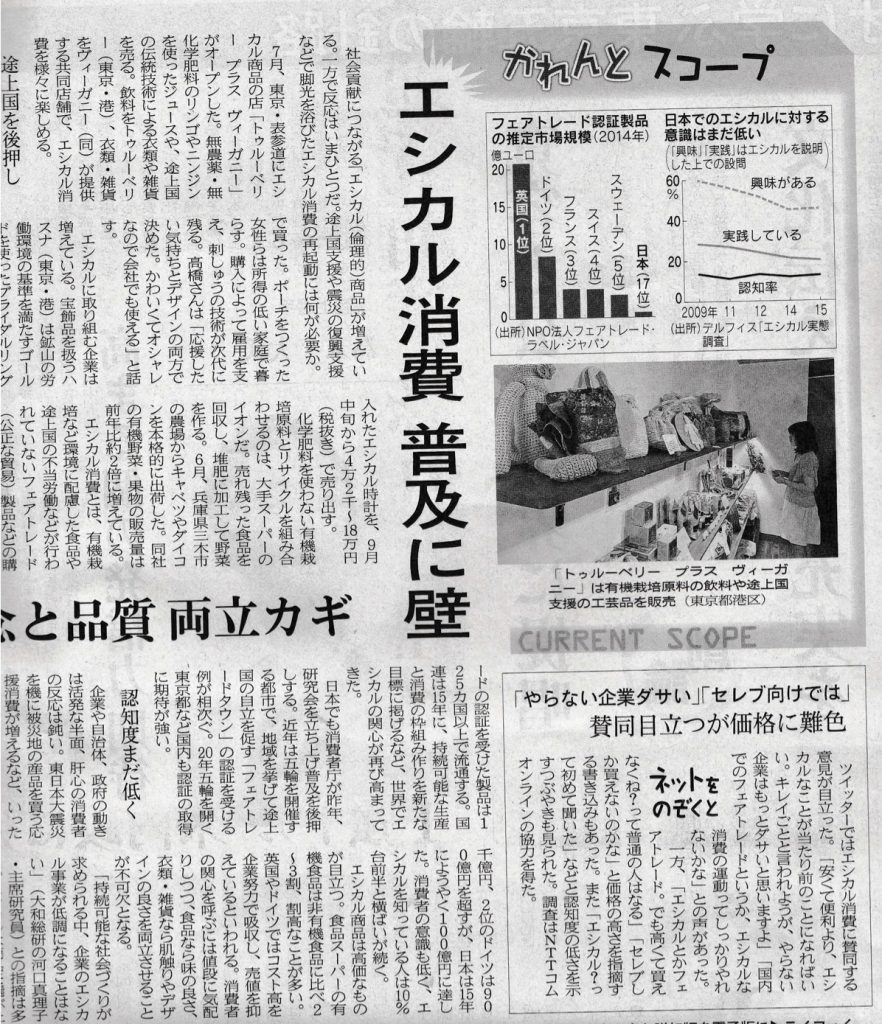引き算のエシカル
Ethical is not only ADDITION of Value but is also SUBTRACTION
(2016.09.30)
引き算のエシカル
9/4付けの日本経済新聞に取り上げていただきました。
記者の方には計2,3回ほど表参道店舗にご来店いただき、「食と衣のエシカル消費」についてかなり深く掘り下げて取材頂きました。今回の記事の方向性が、エシカルが抱えている課題、なぜ日本のエシカル消費が伸び悩んでいる現状を踏まえてのものだったので、わたしが日頃感じている疑問や考えとかなり共通している部分があると感じながら、取材を受けていました。
例えば、記事の中で取り上げられている通り、イギリスでは2000億円、ドイツでは900億円ものフェアトレード消費規模があるにもかかわらず日本ではいまだにたったの100億円。この差は一体どこから来ているのでしょうか。
フェアトレードという点でイギリスやドイツと日本を比較した時に、イギリス人から言われた言葉を思い出します。「日本では飛行機に乗るとき、ペットを物扱いするし、ホテルでは一緒に泊まれないし、少し悲しいね。」
その言葉を聞いたとき、自分が日本を代表したかのように、申し訳ない気持ちが湧き上がり、恥ずかしい気分になりました。
たしかにイギリスでは、早くも1951年にペット認定法が制定され、街頭や公共の場でのペット販売が禁止に。
ドイツではペットショップという言葉は現在では存在しなくなっており、ペットが欲しいときはティアハイムといった、動物愛護センターに行くことが日常です。どう考えても、年間17万匹以上の犬猫が殺処分されている日本はエシカルのひとつである「動物の権利」という点においても、この2国から何十年も遅れているような気がします。
ただ、エシカルという言葉の認知度が低いというだけで、日本人がエシカルに興味がない、というのも実は早合点のような気がしています。先日の講演でもお話ししたのですが、日本には昔から「もったいない」や「おばあちゃんの知恵」といった世界にはない表現や言葉があります。エシカルというと、「エシカルブランドの商品を買わなくてはいけない」とか
「エシカル消費」という行動に頭がいきがちですが、実はいちばん日本人に身近な「もったいない」が一番エシカルだったりします。おばあちゃんから代々伝わる着物を洗い張りをして着たり、着なくなったタオルをぞうきんにし直したり、服をフリーマーケットで売ったり。
エシカルというと、貧困国の女性を支援をしたり、寄付があったり、フェアトレードであったり、そういうことももちろん大切ですが、もし日本人がその感覚に鈍いのだとしたら、自分たちの強みを生かして「もったいないの知恵やアイディア」を海外に広げたり、そういうこともすごく素敵だと思うのです。
谷崎潤一郎の「陰翳礼讃」にもあるとおり、もともと引き算の美学、文化ももった私たちにぴったりだと思います。
Trueberry+VEGANIEのお店では、お客様がマイボトルを持ってきてくださると、少し値段がお安くなりますしなるべく袋を使わない、という方向性を打ち出しています。
また、VEGANIEを代表するカンタ織ストールは、まさに「もったいない」の賜物で、もともとはマーケットに売りに出されていたサリーをもう一度生き返らせることで、価値を生み出しています。

Trueberry +VEGANIE Shop has been featured by Nihon Keizai News paper on 4th Sep.
The reporter kindly has visited our shop 2,3 times for interview and research, we discussed about “ Ethical consumption of food and lifestyle goods”, delved into issues that Ethical market faces now more deeply.
For example, as reporter says in the article, The fair trade market size is 200 billion in England, 90 billion in Germany but still only 10 billion market in Japan. It made me wonder what makes this difference even we (Japan) are all same so called advanced country?
When I hear about “Fair-trade”, I remember what a friend from England said to me in the past.
“ When you guys get on the plane, pets are treated as a baggage, you can’t stay with pets in most of hotels. isn’t it sad a bit?”.
I was just totally embarrassed about myself and had no words to rebel against it. Probably we have to admit that we are behind England and Germany in terms of some ethical issues.
In other hand, I also think there’s some misunderstanding about our low awareness to ethical issues.
The word “Ethical“ is not know well in Japan but we do have alternative words like “ Mottainai”, “Knowledge of Grandma” that no other countries don’t have.
When we say “Ethical”, we tend to imagine to consume something good for nature and people but we have to remember that “Mottainai” is the best word to express “Ethical”.
It’s absolutely ethical action to maintain Grandma’s Kimono, make a floorcloth from ragged cloth, selling dresses at free market.
If this “Mottainai” is Japanese strength, why shouldn’t we leverage our strength?
Why don’t we find ways to reduce waste in our everyday life and live with the spirit of Mottainai?
As Junichiro Tanizaki tells us in “In praise of shadow”, we have culture of subtraction! I believe that Ethical living can come by making consumption choices that add value to society and by reducing waste, living with Japanese spirits of Mottainai- Ethical is Subtraction!
9/4付けの日本経済新聞に取り上げていただきました。
記者の方には計2,3回ほど表参道店舗にご来店いただき、「食と衣のエシカル消費」についてかなり深く掘り下げて取材頂きました。今回の記事の方向性が、エシカルが抱えている課題、なぜ日本のエシカル消費が伸び悩んでいる現状を踏まえてのものだったので、わたしが日頃感じている疑問や考えとかなり共通している部分があると感じながら、取材を受けていました。
例えば、記事の中で取り上げられている通り、イギリスでは2000億円、ドイツでは900億円ものフェアトレード消費規模があるにもかかわらず日本ではいまだにたったの100億円。この差は一体どこから来ているのでしょうか。
フェアトレードという点でイギリスやドイツと日本を比較した時に、イギリス人から言われた言葉を思い出します。「日本では飛行機に乗るとき、ペットを物扱いするし、ホテルでは一緒に泊まれないし、少し悲しいね。」
その言葉を聞いたとき、自分が日本を代表したかのように、申し訳ない気持ちが湧き上がり、恥ずかしい気分になりました。
たしかにイギリスでは、早くも1951年にペット認定法が制定され、街頭や公共の場でのペット販売が禁止に。
ドイツではペットショップという言葉は現在では存在しなくなっており、ペットが欲しいときはティアハイムといった、動物愛護センターに行くことが日常です。どう考えても、年間17万匹以上の犬猫が殺処分されている日本はエシカルのひとつである「動物の権利」という点においても、この2国から何十年も遅れているような気がします。
ただ、エシカルという言葉の認知度が低いというだけで、日本人がエシカルに興味がない、というのも実は早合点のような気がしています。先日の講演でもお話ししたのですが、日本には昔から「もったいない」や「おばあちゃんの知恵」といった世界にはない表現や言葉があります。エシカルというと、「エシカルブランドの商品を買わなくてはいけない」とか
「エシカル消費」という行動に頭がいきがちですが、実はいちばん日本人に身近な「もったいない」が一番エシカルだったりします。おばあちゃんから代々伝わる着物を洗い張りをして着たり、着なくなったタオルをぞうきんにし直したり、服をフリーマーケットで売ったり。
エシカルというと、貧困国の女性を支援をしたり、寄付があったり、フェアトレードであったり、そういうことももちろん大切ですが、もし日本人がその感覚に鈍いのだとしたら、自分たちの強みを生かして「もったいないの知恵やアイディア」を海外に広げたり、そういうこともすごく素敵だと思うのです。
谷崎潤一郎の「陰翳礼讃」にもあるとおり、もともと引き算の美学、文化ももった私たちにぴったりだと思います。
Trueberry+VEGANIEのお店では、お客様がマイボトルを持ってきてくださると、少し値段がお安くなりますしなるべく袋を使わない、という方向性を打ち出しています。
また、VEGANIEを代表するカンタ織ストールは、まさに「もったいない」の賜物で、もともとはマーケットに売りに出されていたサリーをもう一度生き返らせることで、価値を生み出しています。

Trueberry +VEGANIE Shop has been featured by Nihon Keizai News paper on 4th Sep.
The reporter kindly has visited our shop 2,3 times for interview and research, we discussed about “ Ethical consumption of food and lifestyle goods”, delved into issues that Ethical market faces now more deeply.
For example, as reporter says in the article, The fair trade market size is 200 billion in England, 90 billion in Germany but still only 10 billion market in Japan. It made me wonder what makes this difference even we (Japan) are all same so called advanced country?
When I hear about “Fair-trade”, I remember what a friend from England said to me in the past.
“ When you guys get on the plane, pets are treated as a baggage, you can’t stay with pets in most of hotels. isn’t it sad a bit?”.
I was just totally embarrassed about myself and had no words to rebel against it. Probably we have to admit that we are behind England and Germany in terms of some ethical issues.
In other hand, I also think there’s some misunderstanding about our low awareness to ethical issues.
The word “Ethical“ is not know well in Japan but we do have alternative words like “ Mottainai”, “Knowledge of Grandma” that no other countries don’t have.
When we say “Ethical”, we tend to imagine to consume something good for nature and people but we have to remember that “Mottainai” is the best word to express “Ethical”.
It’s absolutely ethical action to maintain Grandma’s Kimono, make a floorcloth from ragged cloth, selling dresses at free market.
If this “Mottainai” is Japanese strength, why shouldn’t we leverage our strength?
Why don’t we find ways to reduce waste in our everyday life and live with the spirit of Mottainai?
As Junichiro Tanizaki tells us in “In praise of shadow”, we have culture of subtraction! I believe that Ethical living can come by making consumption choices that add value to society and by reducing waste, living with Japanese spirits of Mottainai- Ethical is Subtraction!
